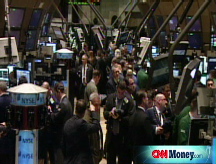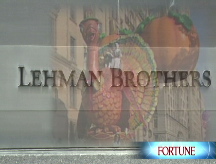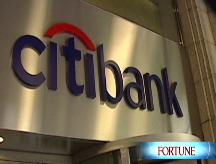Dow's biggest 2-day run since '87
Citigroup rescue and Obama economic team picks propel stocks. Dow sees its biggest two-session point gain ever and biggest two-session percentage gain in 21 years.

NEW YORK (CNNMoney.com) -- Stocks surged Monday in a broad rally as Citigroup's massive rescue package and President-elect Obama's picks for his economic team pushed investors off the sidelines.
The Dow Jones industrial average (INDU) gained 397 points, or 4.9%, after having been up 552 points earlier in the afternoon. The Standard & Poor's 500 (SPX) index rose 6.4% and the Nasdaq composite (COMP) gained 6.3%.
The market also rallied Friday. The two-session gain of 891.10 points was the biggest two-session gain ever, according to Dow Jones. The percentage gain of 11.8% was the biggest two-session percentage gain since Oct. 1987.
The S&P 500 also saw its biggest two-session percentage gain since Oct. 1987, rising 13.2%. Its point gain was not significant statistically.
"There is a massive amount of liquidity on the sidelines but it's sitting behind a dam of fear," said Stephen Leeb, president at Leeb Capital Management.
He said that there needs to be a major catalyst to really start it flowing, but Monday's news had certainly caused some cracks in the dam. In particular, the nomination of Timothy Geithner for secretary of the Treasury was helping Wall Street.
Stocks managed a last-hour rally Friday after reports surfaced that the New York Fed Bank president was Obama's pick. Geithner is currently the No. 2 man at the Federal Reserve after Chairman Ben Bernanke and was the Fed's point person on the Bear Stearns rescue - and Citigroup this weekend.
"Geithner assures a smooth transition between the Bush Administration and that of Obama, because he's already co-managing what's happening now," Leeb said.
Additionally, the combination of Citigroup's rescue and Obama's news shows that both the current and incoming administrations are being active in dealing with the economy. This was a relief after worries last week that there was a lack of leadership in general.
However, the two-day advance was also in part a bounce after a brutal October and two weeks of declines. Even when accounting for Friday's rally, last week was wretched, with the Dow off 5.3%, the Nasdaq off 8.5% and the S&P off 8%.
And the nearly 400-point rally Monday wasn't out of place for a market that has been moving in triple-digits regularly over the last year.
"You have to wonder if this was just a massive short-covering rally, because the fundamentals haven't really changed," said Kim Caughey, senior equity analyst at Fort Pitt Capital Group.
Short-covering is when investors who have sold stocks short to take advantage of a falling market need to buy the stocks back as they start to rise.
Caughey said she doesn't think this is the start of a new, sustained rally just yet. "I understand that the stock market is forward-looking, but I don't see a catalyst out there yet to turn the economy around."
Tuesday brings the release of the third-quarter GDP and the November Consumer Confidence report.
After the close Monday, Hewlett-Packard reported better-than-expected sales and revenue and forecast upbeat fiscal 2009 profit, matching the company's pre-announcement from Nov. 18.
Citigroup: The U.S. government announced a rescue package for the ailing bank on Sunday. The plan includes the Federal Deposit Insurance Corporation (FDIC) guaranteeing losses on more than $300 billion in bad assets.
Additionally, the Treasury will inject another $20 billion on top of the $25 billion it has already made available. The government will receive preferred shares in exchange.
The rescue followed a scary week for the venerable Wall Street firm, in which shares lost nearly two-thirds of their value during the week, while the stock fell below $4 a share, a multi-decade low.
Citi shares jumped almost 58% Monday, firing up the broader bank sector. Merrill Lynch (MER, Fortune 500) gained 38%, Morgan Stanley (MS, Fortune 500) gained 33%, Bank of America (BAC, Fortune 500) rallied 27%,JPMorgan Chase (JPM, Fortune 500) added 21%, Wells Fargo (WFC, Fortune 500) added 20% and American Express (AXP, Fortune 500) gained 13%.
The ProShares Ultra Financials (UYG) ETF rallied 27%.
It was the biggest one-day advance in the S&P financial-service sector's history, since S&P began tracking the group in this form in 1989.
Other movers: But gains covered a variety of stock sectors, with 29 of 30 Dow components rising. The lone decliner was Wall-Mart Stores, which lost a scant 0.3%.
Commodities stocks rose in tune with a rise in commodity prices. Dow components Exxon Mobil (XOM, Fortune 500) and Chevron (CVX, Fortune 500) followed oil prices higher. Component Alcoa (AA, Fortune 500) was among the metals and mining stocks on the rise.
Apple (AAPL, Fortune 500), Dell (DELL, Fortune 500), Microsoft (MSFT, Fortune 500) and Cisco Systems (CSCO, Fortune 500) were among the big tech stocks rising.
Market breadth was positive. On the New York Stock Exchange, winners beat losers by seven to one on volume of 2.04 billion shares. On the Nasdaq, advancers topped decliners by three to one on volume of 2.64 billion shares.
Obama economic team: The President-elect held a press conference in the afternoon in which he formally nominated his economic team.
Obama announced that Geithner is his pick for Secretary of the Treasury and that former Harvard President Lawrence Summers is his pick to run the National Economic Council.
Over the weekend, Obama provided an outline of his recovery plan, including the creation of 2.5 million jobs over the next two years.
At the press conference Monday, Obama said that there is a consensus across the spectrum that a stimulus plan is needed to "jolt this economy back into shape." He acknowledged that no matter what, the U.S. is going to see a big deficit next year because of all the government initiatives undertaken this year.
He also said that financial markets have reflected at times confusion about what the government's plan is to provide stability and that in the future there needs to be more transparency.
Economic news: The housing market continued to weaken, with sales of existing homes declining more than expected in October. The National Association of Realtors said sales fell to a 4.98 million unit annual pace in the month from a revised 5.14 million unit pace in September. Economists thought sales would decline to a 5.05 million unit rate.
Other markets: Global markets were mixed, with Asian stocks ending lower and European markets ending higher.
U.S. light crude oil for January delivery rose $4.57 to settle at $54.50 a barrel on the New York Mercantile Exchange.
The dollar fell versus the euro and gained against the yen.
COMEX gold for January delivery rallied $27.80 to settle at $819.90 an ounce.
Gasoline prices continued to slump to 3-1/2 year lows, with gas down 2.1 cents to a national average of $1.908 a gallon, according to a survey of credit-card activity released Monday by AAA. Prices have been dropping for over two months. In that time, prices have lost $1.95 a gallon, or over 50%.
Bonds: Treasury prices plunged, raising the yield on the benchmark 10-year note to 3.34% from 3.19% Friday. Last week, the 2-year, 10-year and 30-year government bonds all hit the lowest levels since the Federal Reserve started keeping records in 1962.
The yield on the 3-month Treasury bill slipped to 0.01% from 0.02% on Friday, not far from 68-year lows of zero. The 3-month - seen as the safest place to put money in the short term - last hit these levels in September as investor panic peaked. The low yield means nervous investors would rather preserve their money despite no interest rather than risk the stock market.
Lending rates rose a bit. The 3-month Libor rate rose to 2.17% from 2.16% Friday, while overnight Libor rose to 0.8% from 0.7% Friday, according to Bloomberg.com. Libor is a key bank lending rate. ![]()





